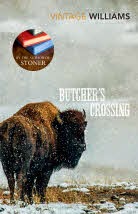Butcher’s Crossing: An extraordinary novel
 Will Andrews leaves his studies at Harvard and goes west in search of the wilderness. It is the 1870s and already on the Great Plains buffalo have been hunted almost to extinction . He falls in with Miller, an experienced buffalo hunter who has an obsession: ten or so years ago he discovered by accident a valley in Colorado full of buffalo. He tells Will: ‘I had the feeling no man had been in that valley before. Maybe some Indians a long time ago, but no man.’ This tells all we need to know about his attitude to the indigenous people.
Will Andrews leaves his studies at Harvard and goes west in search of the wilderness. It is the 1870s and already on the Great Plains buffalo have been hunted almost to extinction . He falls in with Miller, an experienced buffalo hunter who has an obsession: ten or so years ago he discovered by accident a valley in Colorado full of buffalo. He tells Will: ‘I had the feeling no man had been in that valley before. Maybe some Indians a long time ago, but no man.’ This tells all we need to know about his attitude to the indigenous people.
If Will funds the expedition, Miller will make their fortune. The two of them set off with Miller’s bible-bashing, whiskey-swilling friend, Charley, and Schneider who will skin the buffalo.
John Williams begins this extraordinary novel with a quotation from Emerson ending with the lines ‘Here we find Nature to be the circumstance which dwarfs every other circumstance, and judges like a god all men that come to her.’ These men are judged alright and we guess early on Miller’s hubris will be punished in some way. This is a harsh and unforgiving terrain. Early on they pass a couple with three small children who have become detached from a wagon train because of a lame mule. Miller advises then to take a detour from their drive west and recuperate at a fort. The man stubbornly decides to continue – and we understand that they will all die.
This is a tragedy in the classical sense: Miller’s fatal flaw determines the way the plot unfolds. The story could be read as a critique of capitalism or the way human beings exploit and desecrate nature, but none of this is made explicit. The narrative is rooted in the most vividly realised detail: the reader follows step by step the process with which Miller makes bullets, or Will learns to skin a buffalo. It is difficult to read at times: we are spared nothing.
In some ways I think this is a more remarkable novel than Stoner. Other reviewers have compared it – with some justification – to Moby Dick or Heart of Darkness. The book that came to my mind was Rachel Carson’s Silent Spring, published in 1962, nine years before Butcher’s Crossing. In trying to take all, we risk losing all.